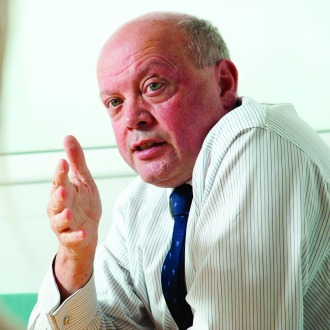CQC chief has no confidence ‘at all’ in revalidation process

The CQC’s chief inspector of primary care has ‘no confidence at all’ in the ability of the revalidation process after finding cases where there was ‘very little evidence’ that revalidated GPs were staying up to date, he said today.
Speaking at NICE’s annual conference this morning, Professor Steve Field said CQC’s inspection process should be supported by NHS England area teams through revalidation – but added he did not think it was currently up to the job.
Professor Field said: ‘We mustn’t forget that [checking the quality of] general medical practices is the role of NHS England… as well – the revalidation of GPs goes through the local area team, so they should be picking things up on appraisals.
‘So it’s not just about us going in and responding – they are part of this set up as well, we work very closely with them and really we shouldn’t be having any surprises because they should be there, monitoring the contract and working with people.’
However, asked by chair Dr Philip Hammond, former GP and broadcaster on NHS issues, whether he was confident that the GMC’s appraisal and revalidation process does pick up problems, Professor Field replied: ‘No. Not at all.’
Related stories
Analysis: Revalidation loses GPs’ goodwill
Revalidation figures don’t tell the full story
Revalidation process is unable to adequately assess GPs, MPs find
Speaking to Pulse about why he lacked confidence in the process, Professor Field said he was concerned appraisals had not picked up cases where GPs were found wanting when it came to their CQC inspections – and warned he does not think NHS England has enough resources to do the job properly.
Professor Field said: ‘It’s not just the revalidation part but the appraisal. And what we’re picking up on our visits is the old ethos of regularly completing audit cycles doesn’t seem to be as common as it was a number of years ago.
‘My answer “no” is really that we’ve seen some practices where there’s been very little evidence of the GPs keeping up to date even though they had successfully been through a number of appraisals.
‘I can’t say [they have not completed clinical audits] – we haven’t had access to the appraisal documentation and nor should we because it’s confidential with the area team. But in future we would want to work with the area team and we would really like GPs to demonstrate to us when we go into their surgeries how they are learning and changing their practice based on clinical audits.’
He added: ‘I was working on revalidation as chair of College and I think the concept is really good. But we need to get a common standard across the country. And I know [NHS England deputy medical director Dr] Mike Bewick is working on this nationally but my observation is that within NHSE it doesn’t have the administrative support – particularly at area team level – so I worry about the resources being put into it and the possibility of variation.’
The revalidation process, which is carried out by the GMC, with NHS England providing the responsible officers who sign the revalidation of a doctor, was criticised by a group of influential MPs earlier this year, which found responsible officers were unable to form the necessary professional relationship with the practitioners they are assessing.
This followed an official report produced by the NHS Revalidation Support Team (RST), which found that doctors spent up to 15 hours a year on revalidation – six hours more than had been expected – which itself was short of the 40 hours estimated by one GPC negotiator last year.
During a discussion on how whistleblowers can be protected, Professor Field said the inspection team were increasingly receiving reports from nurses, practice managers and doctors about the standards of care in GP surgeries and that protecting their identity ‘is difficult sometimes’.
Professor Field said: ‘We’re getting an increasing number of [reports from] nurses, practice managers and even doctors about worries about the care in those surgeries.
‘These aren’t necessarily small surgeries – they can be big teaching surgeries, where the leadership – the well-ledness has gone, surgeries are dirty or they are not following the best NICE guidance or things like that.
‘And of course if you’re a nurse in a single handed surgery and you raise concerns about care you are likely to lose your job. So when we contact surgeries we do try to retain that persons anonymity where we can but it is very difficult for us sometimes.’
Niall Dickson, chief executive of the GMC, said: ‘Revalidation is at a very early stage. It is a success story so far. Throughout the NHS there are stronger systems of appraisal and clinical governance than ever before, and revalidation has been a significant catalyst of that change. We have never said that revalidation would detect every problem but the process that we and the healthcare system are building together will help to spot problems earlier and support doctors.
‘We also recognise that in England NHS local area teams who have responsibility for clinical governance in primary care and are the responsibility of NHS England are under pressure but a great deal of good work is being done and across the UK the systems for supporting and monitoring medical practice have improved and are improving – that will mean better safer care for patients.’









